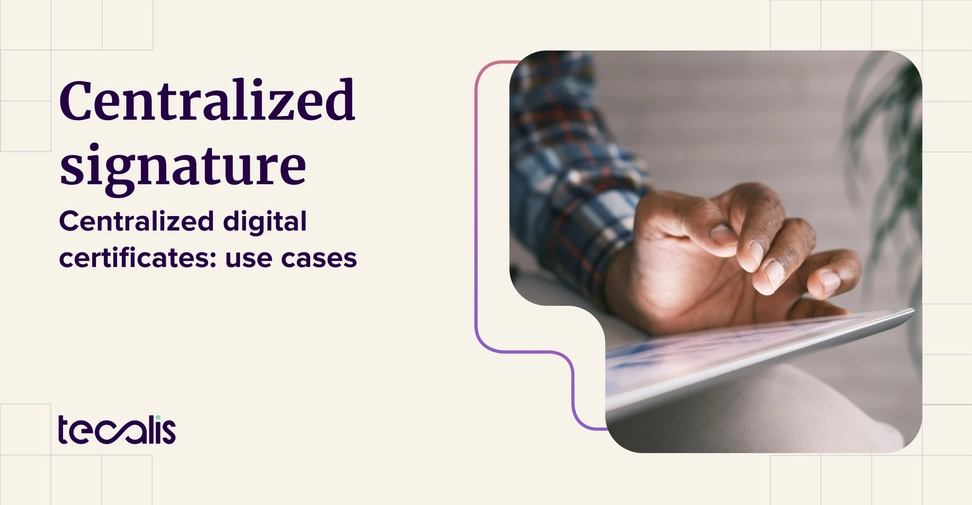Index
Get the latest news right in your inbox
In today's digital era, security and efficiency in electronic document management are paramount. The centralized signature emerges as an innovative solution that facilitates the authentication and signing of documents from any device with an internet connection and access to the platform where the certificate is hosted. Among the different electronic signature modalities, the centralized signature stands out for its efficiency and flexibility.
In this article, we will explore in depth what a centralized signing certificate is, its characteristics, issuing processes, available platforms, legal aspects, types and the advantages and disadvantages associated with its use.
What is a Centralized Signature Certificate?
A centralized signing certificate is an electronic certificate stored and managed in secure servers, instead of being hosted in local devices such as cryptographic cards or hard disks. This modality allows users to perform electronic signatures independently of the browser, device or operating system used, facilitating the process even from mobile devices.
This digital cryptographic file allows advanced electronic signatures with certificate and qualified from any device connected to the Internet, without the need to install specific software or rely on locally stored keys. Unlike traditional certificates, these are hosted on secure servers managed by a certification authority or an authorized platform, which guarantees greater control, accessibility and traceability.
What is Centralized Signature? Characteristics and definition
Centralized signature is an electronic signature implementation model where digital certificates are stored in the cloud, i.e. on servers managed by trusted entities (QTSPs). This approach offers several significant advantages:
- Accessibility: Allows users to sign electronic documents from any device with an Internet connection, without the need for additional hardware.
- Environment Independence: The electronic signature can be made independently of the browser or operating system, offering greater flexibility.
- Scalability: Easily adapts to the needs of companies and organizations of any size.
- Security: The certificates are guarded by reliable certifying authorities, guaranteeing high levels of security in the signature process.
Centralized signing is characterized by the outsourcing of the digital certificate. Instead of being stored on a physical device such as a token or cryptographic card, or on the user's own computer, the certificate resides on a secure server managed by a trusted service provider. This facilitates access to the electronic signature from any location and device, simply with the credentials to access the service.
Thus, we can define centralized signature and centralized signature certificates as a type of advanced electronic signature that uses a digital certificate stored on a remote server to guarantee the authenticity and integrity of electronic documents. It is based on the use of a public key infrastructure (PKI) that allows the generation, management and secure custody of digital certificates.
How to issue Centralized Signature Certificates?
The issuance of a centralized signing certificate involves several steps to ensure the authenticity and security of the user:
- Registration in the Authentication System: The user must register in a state-recognized authentication system, such as Cl@ve Permanente in countries like Spain, providing their personal data and establishing access credentials.
- Certificate Request: Through the corresponding platform, the user requests the issuance of the centralized signature certificate. This process may require prior authentication by means of a valid electronic certificate.
- Proof of Identity: Depending on the issuing entity, it may be necessary to prove identity in person at an authorized registry office or by secure telematic methods.
- Generation and Storage of the Certificate: Once the identity is verified, the certificate is generated and stored in the secure servers of the certifying entity that is decided, being available for its use in the electronic signature from the electronic signature platform.

Centralized Signature Certificate: Available Platforms
Each platform offers different functionalities, such as user management, signature tracking, integration with other applications or customization of the signature process. It is important to choose the platform that best suits the needs of each user or company.
There are several platforms that offer centralized signature services, among which the following stand out:
- Cl@ve Firma: Implemented by the Spanish Public Administration, it allows citizens to sign electronically from any device with an Internet connection, using centralized certificates held by the General Directorate of the Police and the Social Security IT Management. Perfect for procedures with the public administration and organizations such as the tax authorities.
- FNMT-RCM: The Fábrica Nacional de Moneda y Timbre offers the issuance of centralized signature certificates as a complement to the public employee certificate.
- Tecalis Sign: Leading electronic signature platform, which offers a certificate manager module to store signature certificates for easy use. It is characterized by its scalability and its ability to manage large volumes of documents.
Legality and Validity of the Centralized Signature
The electronic signature made by means of centralized signature certificates has full legal validity, as long as it complies with the requirements established by current regulations. In the European Union, Regulation (EU) No. 910/2014, known as eIDAS, regulates electronic identification and trust services, establishing a legal framework for electronic signatures. This regulation recognizes the legal equivalence of electronic signatures with handwritten signatures, provided that qualified certificates issued by trust service providers are used.
It is essential that centralized signature platforms comply with the applicable standards and regulations to guarantee the legal validity of the electronic signatures made through their services.
Requirements for the legal validity of the centralized signature:
- Identification of the signatory: The issuance process of the centralized signature certificate must guarantee the unequivocal identification of the signatory, as well as its use in the digital signature platform.
- Signatory's exclusive control: The signatory must have exclusive control over the signature creation data.
- Document integrity: The signature must be linked to the document in such a way that any subsequent modification is detectable.
- Time Stamp: The signature must include a time stamp to determine the exact time it was made.
Advantages of using Centralized Signature Certificates
- Global Accessibility: Certificates stored on servers allow users to sign documents from any device with an Internet connection, eliminating geographical barriers and hardware limitations.
- Enhanced Security: Certificates are hosted in secure infrastructures managed by certificate authorities. This minimizes the risk of loss or theft, unlike certificates stored on physical devices such as USB or cryptographic cards.
- Multi-Platform Integration: Centralized signatures are compatible with different browsers, operating systems and devices, making them easy to deploy in diverse environments.
- Process Automation: This model allows the integration of electronic signatures into automated workflows, improving efficiency in business processes such as contract management, invoicing or approvals.
- Legal Compliance: Centralized signature certificates issued by trusted authorities comply with international regulations, such as the eIDAS Regulation in Europe, which ensures their legal validity in electronic transactions.
Centralized signature certificates or biometric advanced electronic signature?
The centralized signature certificate has established itself as a key tool for companies and institutions seeking to improve efficiency and security in electronic document management. Its ability to facilitate remote signing from any device, together with compliance with international legal standards such as the eIDAS Regulation, makes it an essential solution in an increasingly digitalized world.
However, its adoption requires careful evaluation of the pros and cons, as well as consideration of the specific needs of each organization with other equally secure and legally binding but more flexible alternatives such as advanced electronic signatures. Understanding what a centralized signature certificate is, how it is issued, which platforms support it and the associated legal aspects, allows companies and professionals to make informed decisions about its implementation.
If your company is looking to optimize its processes, this can be an excellent solution to adapt to the demands of today's market.
























